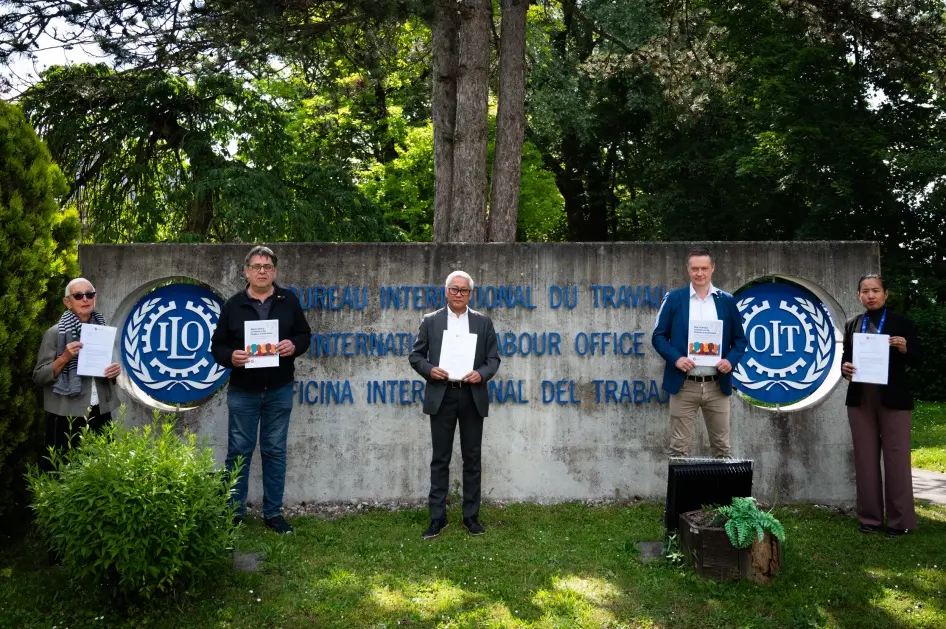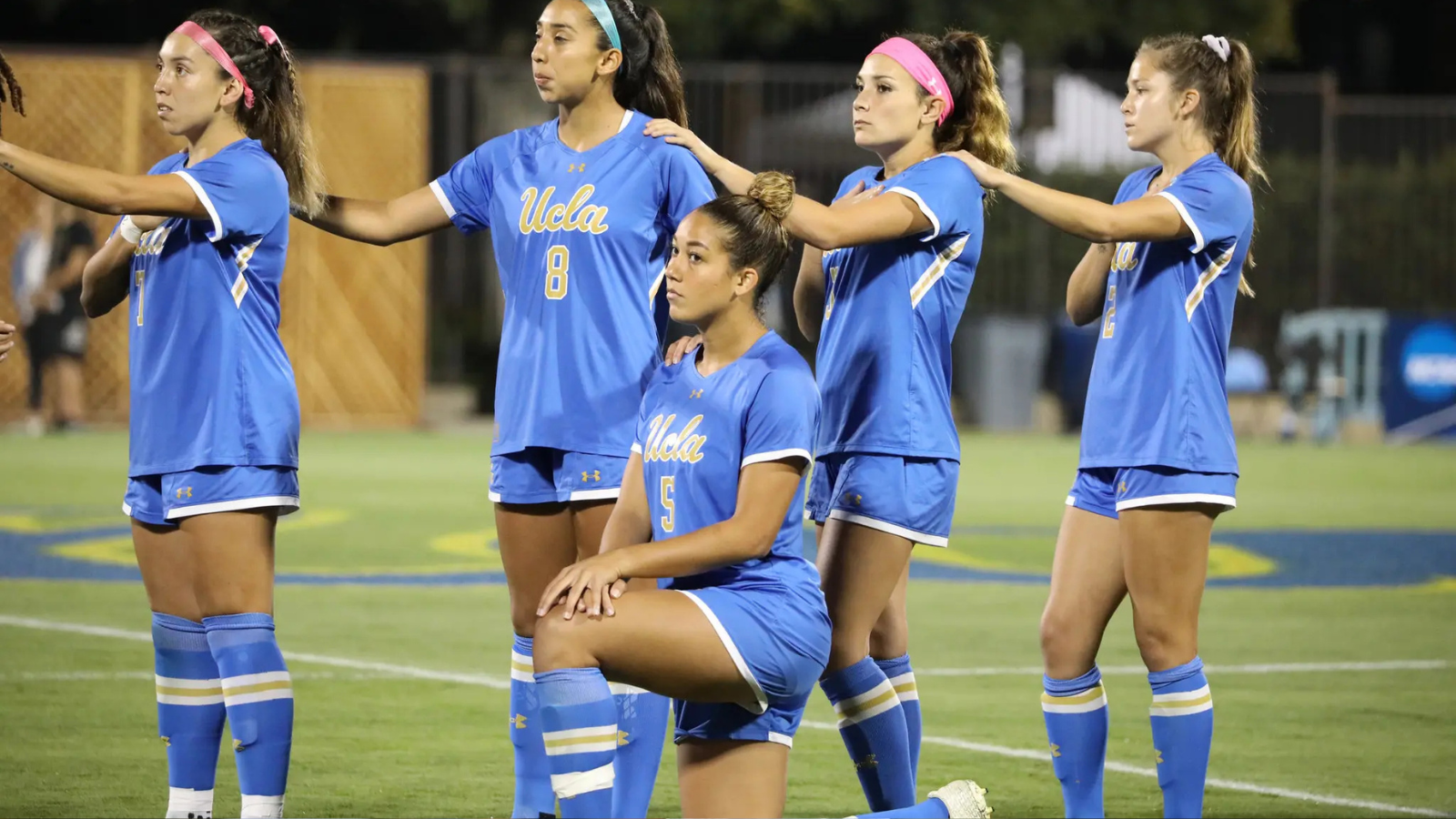Global Union Filing Stresses Urgent Need for Labor Reforms, Remedy for Past Abuses
(Geneva) – A forced labor complaint against the Saudi Arabian government filed by a global trade union is a significant warning to Saudi authorities and businesses and investors in the country about the predictable and preventable migrant labor abuses associated with the government’s Vision 2030 plan that relies on millions of migrant workers, Human Rights Watch said today.
In the complaint filed under article 24 of the International Labour Organization (ILO) constitution on June 5, the 12 million-member-strong Building and Wood Workers’ International Union (BWI) highlights the exploitative living and working conditions among the country’s vast migrant workforce of more than 13.4 million people, including widespread wage theft. The ILO complaint is filed ahead of the upcoming July decision by FIFA, which controls international soccer, to greenlight Saudi Arabia as host of the 2034 FIFA World Cup for which the kingdom has become the “sole bidder,” in contravention of FIFA’s own human rights rules and requirements for human rights and labor due diligence.
“This ILO forced labor complaint should serve as a wake-up call for Saudi authorities to course-correct and remedy past abuses including the unpaid wages of tens of thousands of migrant workers,” said Minky Worden, director of global initiatives at Human Rights Watch. “A complaint by a global trade union should be seen as a flashing alarm for businesses and organizations like FIFA planning massive events and operations in Saudi Arabia, given the clear government failures to protect migrant workers from exploitative and abusive employers.”
The BWI complaint is based on a portfolio of evidence, including tens of thousands of workers with unpaid wages from two Saudi-based construction companies that went bankrupt in 2016 and testimony from 193 migrant workers who have faced a range of abuses, including restriction of movement, intimidation and threats, retention of identity documents, debt bondage, abusive working and living conditions, and excessive overtime. The harms from these abuses are further exacerbated because workers are denied the right to freedom of association and collective bargaining.
BWI’s complaint cites numerous cases of migrant worker abuse, calling out Saudi Arabia’s failure to enforce several international treaties it has ratified, including the Forced Labour Convention (no 29) and its 2014 Protocol.
One of the complaint’s representative cases involves a former Saudi employee of the now-liquidated Saudi Oger from 1990 to 2015, who faced severe financial hardships due to withheld salary and restrictions transferring to another employer, leaving him to subsist on discarded food. He eventually died from a heart attack. A decade later, his family is still trapped in a cycle of debt and vulnerability and has yet to be compensated. The Executive Court in Riyadh estimated in 2019 that the now-liquidated Saudi Oger owed an estimated SAR 2.6 billion (about US$693 million) in unpaid wages and other benefits to workers. While some repayment has begun almost a decade later, Human Rights Watch research shows that the process has been rife with problems.
Accounts of unpaid wages are common across Saudi Arabia, despite labor reform initiatives that have so far failed to adequately protect migrant workers. Research by Human Rights Watch has also documented extensive ongoing cases of wage theft by employers, with many recent workers returning home without what is owed to them.

Saudi Arabia’s abusive kafala (labor sponsorship) system for foreign workers gives employers excessive power over their mobility and legal status in the country, including workers’ ability to leave a job. A BWI survey of 193 migrant workers included in the complaint reveals that 63 percent cannot freely terminate their employment with reasonable notice or leave after their contracts expire. Additionally, 85 percent of indebted workers cannot leave their jobs freely, 65 percent lack access to their documents such as passports, and 46 percent report that employers delay or withhold wages to coerce them into staying.
“These cases and statistics paint a sobering picture of the current situation of migrant workers who come to Saudi Arabia to better provide for their families back home,” Worden said. “It is clear that the Saudi labor system gives employers excessive control over workers to carry out egregious abuses with impunity.”
FIFA continues to turn a blind eye to the situation. When FIFA named Qatar the World Cup host in 2010, it was without human rights due diligence on the dangerous conditions for millions of migrant workers who were needed to build stadiums and hotels, working under Qatar’s kafala system. The failures of FIFA’s human rights due diligence were evident when trade unions, including BWI, filed a forced labor complaint against Qatar in 2014, highlighting widespread labor exploitation.
The Qatar ILO complaint led to an impetus for labor reforms in the country. However, Human Rights Watch research has shown the reforms came too late and were too limited and narrow in scope. Many migrant workers who made the 2022 World Cup possible faced serial abuses, including unexplained deaths and wage theft. Calls to remedy these abuses were also ignored by FIFA and Qatari authorities. The legacy of the 2022 World Cup – referred to as “the best World Cup ever” by FIFA President Gianni Infantino – includes lasting harms for many migrant workers and their families spread across Asia and Africa.
“FIFA has clearly failed to learn from the 2022 Qatar World Cup that awarding its tournament without human rights and forced labor protections can lead to catastrophic abuses,” Worden said.
FIFA has made no plans public for risk assessments, monitoring, or implementing worker protection standards for the 2034 Saudi World Cup. In 2023, FIFA commissioned an independent review of remedies for abuses. The report has not been released despite the urgent need to compensate the workers who suffered building and servicing the 2022 World Cup.
Beyond the 2034 World Cup, other mega- and giga-projects in Saudi Arabia that fall under the auspices of Saudi Arabia’s Vision 2030, such as the futuristic NEOM city, will also rely on a large construction workforce, which is inadequately protected under Saudi Arabia’s labor system.
International companies flocking to Saudi Arabia to profit from these megaprojects and their corporate sponsors risk causing, contributing to, or being directly linked to migrant rights abuses endemic in Saudi Arabia unless they take rigorous due diligence to ensure their activities do not further migrant rights abuses.
“Saudi authorities, who are spending billions to launder and sportswash their abysmal human rights reputation, would be better served investing in effectively implementing the labor reforms they have promised but so far failed to deliver,” Worden said.







